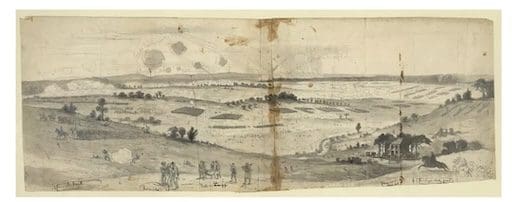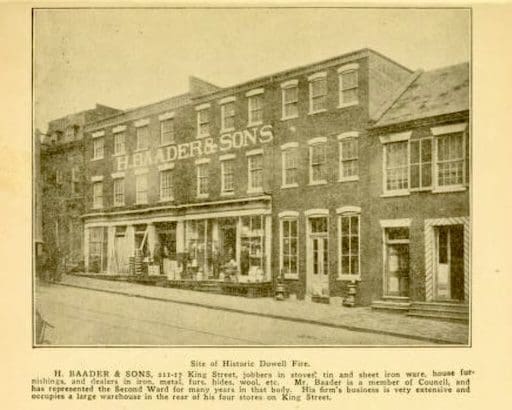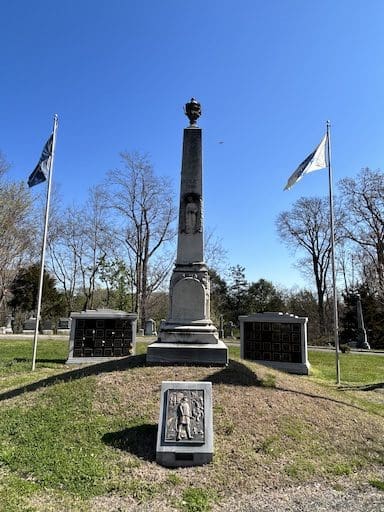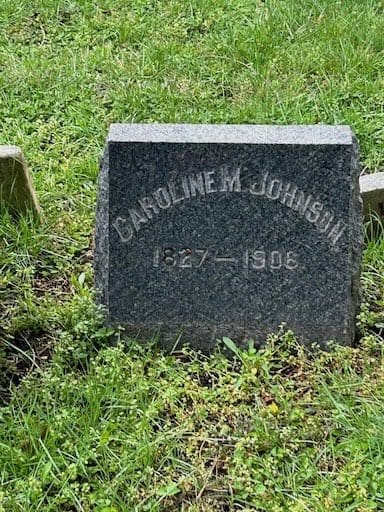In the annals of American Civil War history, countless stories of bravery, sacrifice, and unwavering dedication to one’s cause remain untold. Among these is the remarkable tale of Caroline Matilde Johnson, born Caroline Matilde Weedon. A fervent supporter of the Confederate cause who risked her life to aid Southern soldiers, she now rests alongside many of her family members in Alexandria’s Methodist Protestant Cemetery, part of the historic Wilkes Street Cemetery Complex.
A Clever Smuggler and a Daring Mission
While not as well known as other women Confederate spies in the Civil War, such as Belle Boyd and Rose O’Neal Greenhow, Caroline’s ingenuity and resourcefulness knew no bounds regarding supporting the Confederate cause. She smuggled much-needed medical supplies and essentials to Confederate troops by cleverly concealing these items within the numerous pockets of her petticoat hidden beneath her voluminous skirts. Caroline also undertook a daring mission to assist the renowned Confederate General J.E.B. Stuart.
On one occasion, Caroline Johnson was tasked with obtaining a plume for General Stuart, who had lost his own in battle. This may have been the hat and plume Stuart lost at Verdiersville on August 17th, 1862, when Federal pickets on reconnaissance struck Raccoon Ford on the Rapidan during a brief lapse in Confederate coverage that evening. Shielded by darkness, they advanced undiscovered into Confederate lines south of the river. Lying on the porch–easy prey for the Yankees–were his cloak, haversack, and, most notably, his plumed hat. Few scenes of the war so humiliated Stuart: The Yankees made off with the iconic symbol of one of the Confederacy’s most celebrated cavalry commanders.
Caroline smuggled a replacement ostrich plume for General Stuart’s distinctive hat during this mission. She daringly carried the precious cargo through Union-controlled territory, successfully navigating enemy lines to deliver the item to General Stuart in the Fredericksburg area. In addition to the plume, Caroline also transported food hidden beneath her voluminous skirts, which she brought to Stafford County, her place of origin.
This bravery and dedication showcased her unwavering commitment to the Confederate cause and her willingness to take risks in support of the troops and their leaders.

Caroline’s resourcefulness and courage made her an invaluable asset to the Confederate war effort, even if her contributions remained less widely recognized than those of other famous female spies of the era.
Stuart’s Revenge and a Proposed Exchange
Stuart got revenge during the Northern Virginia Campaign when he captured General Pope’s headquarters train at Catlett’s Station on August 22-23, 1862, seizing Pope’s official papers, the army treasure chest, and all the General’s and his staff’s baggage. (Pope himself was at his headquarters several miles away.) Before sending Pope’s coat to Governor John Letcher in Richmond as a prize of war, Stuart wrote a message to Pope: “General. You have my hat and plume. I have your best coat. I have the honor to propose a cartel for the fair exchange of the prisoners.” John Pope never responded, but J.E.B. Stuart had his revenge for the humiliating loss of his hat and cloak to Pope’s marauders at Verdiersville on August 17th, 1862.
Following this incident, Pope’s Army of Virginia was soundly defeated by the Confederate Army of Northern Virginia at the Second Battle of Bull Run (August 28-30, 1862), marking a significant victory for General Lee and the Confederacy.

Edwin Forbes
Personal Tragedy Amidst War
Tragically, just before the Civil War, Caroline’s husband, John Johnson, fell victim to a brutal attack that underscores the heightened tensions among civilians in the lead-up to the conflict. He was returning home from a meeting when he was savagely assaulted, suffering a severe brain concussion. The incident occurred in May 1860, a time when the nation was grappling with the increasingly divisive issue of slavery and the growing rift between the North and the South. The vicious attack on John Johnson, while not directly attributed to political differences, serves as a stark reminder of the volatile atmosphere that permeated communities across the country as the nation edged closer to war. John was taken to Occoquan, Virginia, just south of the border with Fairfax County, where he succumbed to his injuries in December 1860 or early 1861. He was buried in Occoquan, leaving Caroline a widow at the cusp of the Civil War.
A Family Legacy of Service
Caroline’s son, John Johnson Jr., carried on the family’s legacy of service and prominence in Alexandria. He married Mary Agnes Aitcheson, a member of a notable local family, and went on to become the President of the Alexandria Chamber of Commerce. His distinguished career lasted until he died in 1910.
Ties to the American Revolution
Caroline’s family had a proud history of military service that extended beyond her contributions during the Civil War. According to the Johnson family, they are connected to the Weedon family of Fredericksburg, Virginia, specifically to Marion Weedon McDaniel’s family. While Caroline was not a direct descendant of General George Weedon, who served in the Continental Army during the American Revolutionary War, the Johnson family maintains that General Weedon was a sibling of one of Caroline’s ancestors. This connection, although indirect, further cements the Johnson family’s place in the annals of American military history.
This legacy of service undoubtedly influenced Caroline’s dedication to the Confederate cause and her willingness to take risks in support of the troops and their leaders. The Johnson family’s enduring commitment to serving their country, spanning multiple generations and conflicts, highlights the deeply rooted patriotism and sense of duty that characterized many American families throughout history.
Tragedy Strikes Close to Home
Caroline’s sister, Catherine Ann Johnson, faced her own heartbreaking loss when her husband, George O. Plain, perished in the 1855 Dowell China Shop fire in Alexandria. Plain was a skilled painter by profession, and his untimely death left Catherine a widow with six children to raise on her own. Their children were Benjamin, aged 18; Ann (also known as Anna Bella), aged 15; Mildred, aged 12; John, aged 10; Catharine, aged 8; and the youngest, Caroline Amy, aged just 5 years old at the time of their father’s passing.

On November 19th, George O. Plain was laid to rest alongside fellow firefighters William E. Evans, James W. Keene, and Robert I. Taylor in the Methodist cemetery. The funerals were attended by an estimated crowd of over 4,000 people, a testament to the profound impact of the tragedy on the close-knit Alexandria community.
This devastating loss serves as a poignant reminder of the sacrifices endured by those connected to the Johnson family and the deep historical roots they had in the community. The resilience and strength demonstrated by Catherine Ann Johnson in the face of such adversity undoubtedly influenced and inspired Caroline’s own unwavering commitment to her family and her cause throughout her life.

A Legacy Remembered: The Johnson Family in Alexandria’s Historic Cemeteries
Caroline Matilde Johnson (1827-1906) and many of her family rest in the Methodist Protestant Cemetery, part of Alexandria’s Wilkes Street Cemetery Complex. The Johnson family is buried in plots E:58 and 59, a testament to their deep roots and enduring presence in the community. This historic cemetery serves as a tangible reminder of the Johnson family’s legacy and significant contributions to the city’s rich history.

In addition to the Methodist Protestant Cemetery, other members of the Johnson family are buried in the Presbyterian Cemetery and St. Paul’s Cemetery, further highlighting the family’s extensive ties to Alexandria. These final resting places provide a powerful connection to the past and offer a space for reflection on the lives and sacrifices of those who came before us.
Alexandria also commemorates the victims of the Dowell China Shop fire annually, ensuring their sacrifices are never forgotten. Caroline Matilde Johnson’s efforts, including her daring mission to replace General Stuart’s lost plume and her family’s enduring legacy, serve as a testament to the personal dimensions of war and the lasting impact of individual contributions to their cause.
As we explore the lives of those who lived through the Civil War era, stories like Caroline Matilde Johnson remind us of countless individuals’ courage, determination, and resilience. By bringing these tales to light, we gain a more comprehensive understanding of the conflict and the people who shaped its course. Caroline’s legacy, interwoven with that of her family and the city of Alexandria, inspires us all, highlighting the power of personal conviction and the enduring spirit of those who fought for what they believed in.
Acknowledgment: Special thanks to Tracy Burke, a descendant of Caroline Matilde Johnson, for providing valuable oral and written history about the Johnson and Aitcheson families. Her contributions were essential in piecing together the fascinating story of Caroline Matilde Johnson and her family’s legacy in Alexandria, Virginia.
Sources of Information
Pippenger, W. E. (2008). Tombstone Inscriptions of Alexandria, Virginia: Volume 2. Heritage Book, Inc.
Weinraub, C. (2017). The Firefighter’s Memorial in Ivy Hill Cemetery, Alexandria, Virginia. The Alexandria Chronicle, Fall 2017. Alexandria Historical Society, Inc.
Wedderburn, A. J. (1907). Souvenir Virginia Tercentennial of Historic Alexandria, Va., Past and Present. [Alexandria]. Retrieved from the Library of Congress website: https://www.loc.gov/item/11031827/
Davis, D. (2017, August 16). “I intend to make the Yankees pay”: J.E.B. Stuart’s operations in August 1862 (Parts 1-3). Emerging Civil War. https://emergingcivilwar.com/2017/08/16/i-intend-to-make-the-yankees-pay-j-e-b-stuarts-operations-in-august-1862/